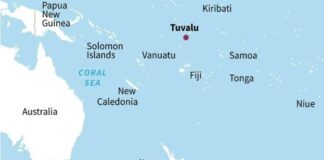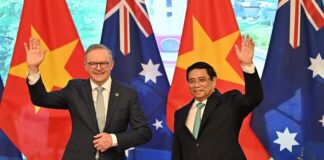Hong Kong’s extraordinary protest movement has now lasted over ten weeks. Every weekend brings new demonstrations, and battles with police.
Protesters have occupied the airport for days, disrupting flights. Up to two million joined the largest of the protests in July.
The Beijing government has issued strident warnings, labelling the protesters “violent criminals” and declaring, “As for their punishment, it’s only a matter of time.” Hong Kong’s leader Carrie Lam warned protests were approaching “a point of no return”.
This has led to fears of a Tiananmen Square style crackdown. But sending in the military to crush the demonstrations would carry a high cost. Business investment would flee the province, seriously damaging its economy.
The authorities are for now hoping to wear down the protesters, with heavy police repression and an attempt to force more and more dramatic confrontations with police.
In early August police announced that they had arrested 420 people since June, with widespread use of tear gas as well as rubber bullets against demonstrators.
Police have also used Triad gangs to stage brutal attacks on protesters. On 21 July, thugs in white t-shirts armed with metal poles and bamboo sticks moved into the Yuen Long subway station following a protest, indiscriminately attacking protesters as well as other passengers. Police failed to respond to emergency calls for 50 minutes.
According to Hong Kong-based socialist Lam Chi Leung, “The Hong Kong government hopes to discredit the demonstrators as a riotous mob. By doing this, it hopes to regain some popularity from the masses which is now at an all-time low.
“But, despite its best efforts, public opinion has not been significantly reversed. On the contrary, the police’s obvious collusion with organised crime aroused greater anger among ordinary people.”
The protests began over a bill that would allow China to extradite political opponents to the mainland for trial. Hong Kong’s leader Carrie Lam has halted the bill but refused to completely scrap it. Protesters are also demanding an independent inquiry into the police’s behaviour and the democratic election of the territory’s leader.
Under the agreement that brought Hong Kong under Beijing government control in 1997, the territory has greater democratic rights than the rest of China, but its leader must still be approved by the central government.
Recent years have seen increasing efforts by the central government to assert control, including the arrest of leaders of the Umbrella movement of 2014 and bans on candidates who tried to stand for political office.
Strikes
In early August the territory was shaken by a general strike. The Hong Kong Confederation of Trade Unions said 350,000 workers took part. Hundreds of flights were cancelled as air traffic controllers called in sick.
Workers in the civil service, advertising, finance, construction and retail also joined in. Protesters “enforced” the strike on the Metro by holding open train doors, disrupting peak hour services.
Hong Kong’s union movement is divided, with the larger pro-government union federation working to undermine the strike.
While this was “an initial attempt”, there are also plans to launch, “a larger and longer general strike” in the future, according to Lam Chi Leung.
“Some demonstrators have realised that they need to unite with the masses on the Chinese mainland”, he said. “They distribute leaflets to tourists from mainland China to explain the purpose and significance of the mass movement.” This is vital to undermining the Beijing government’s ability to crush the movement.
But there are also right-wing forces that see both the mainland government and people as their enemy. The slogan used by a far right group “Liberate Hong Kong—revolution of our times” has been taken up by some of the demonstrators.
More widespread and sustained strike action will be needed for the movement to succeed. Action at a workplace level could bring the mass of Hong Kong’s working class into active support for the movement.
Achieving this means connecting the struggle to a fight against surging inequality and declining social conditions. Hong Kong is one of the world’s most unequal places, with long working hours and hugely expensive rents.
This kind of struggle could win support across mainland China—and mobilise the power that could beat China’s ruling class.
By James Supple





